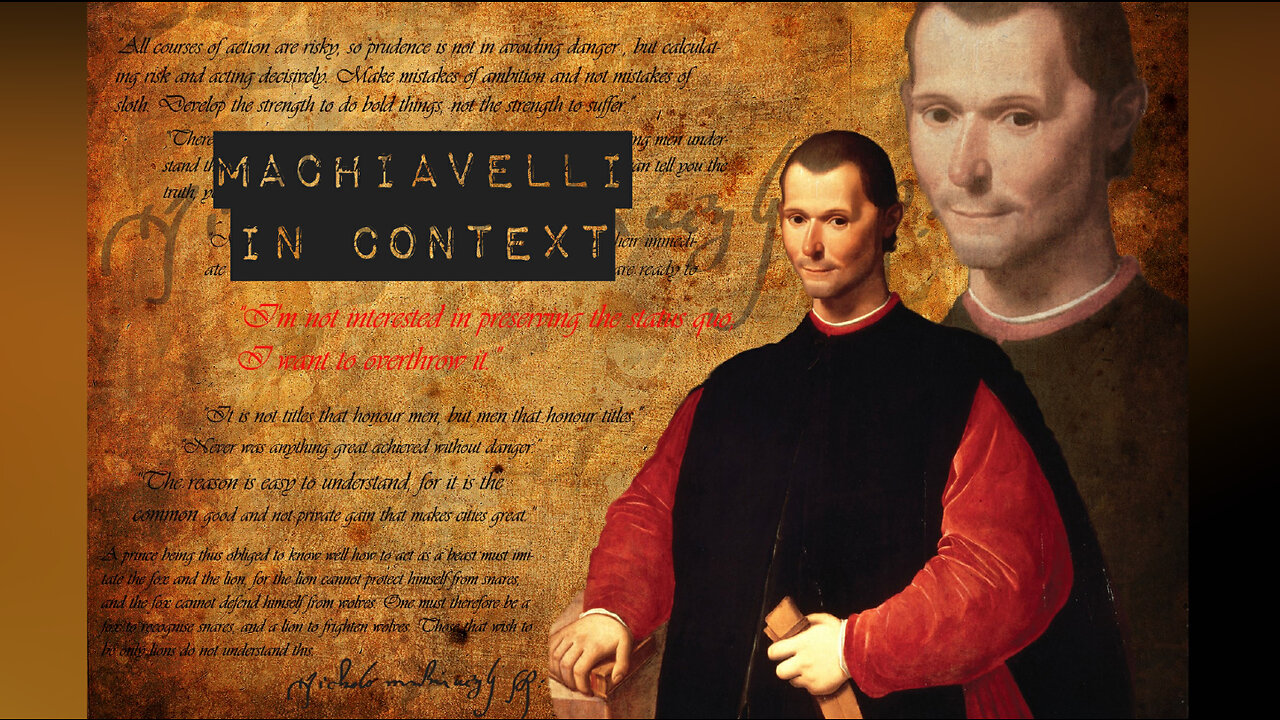Premium Only Content

Machiavelli in Context | Discourses: Conspiracies and Other Dangers (Lecture 20)
Lecture 20: After using some famous historical examples to emphasize the importance of taking action against opposition when a change of government occurs, Machiavelli writes at great length about the nature of conspiracies. Although they are dangerous, they are quite difficult to execute successfully. He uses ancient examples but is particularly interested in the Pazzi conspiracy against the Medici in 1478.
Although Machiavelli respected the leader of the Florentine Republic, Piero Soderini, he realizes that different qualities are needed in leaders in different historical circumstances. Hence, while some cautious leaders like Soderini are successful sometimes, it was Soderini’s timidity at a time when boldness was needed that led to the fall of the republic.
In the final sections of his Discourses, Machiavelli returns to and reiterates several of the central themes of the book—for example, the need for a well-trained army and the collective wisdom of the people.
At the end, Machiavelli points out that customs have a great power in societies and that changes are made only with some difficulty. Continuity, however, is more the product of education than of a conservative aristocracy.
Recommended Readings:
Machiavelli, Discourses on Livy, translated by Julia Bondanella and Peter Bondanella, Discourse III, chapters 2–49.
-
 43:37
43:37
Adaneth - History&Politics
4 days agoHitler's Warriors | Udet - The Flyer (Part 4)
53 -
 LIVE
LIVE
SpartakusLIVE
3 hours agoSOLOS on ARC Raiders || WZ Stream LATER
2,012 watching -
 LIVE
LIVE
GritsGG
4 hours agoBO7 Warzone Is Here! Win Streaking! New Leaderboard?
332 watching -
 1:00:55
1:00:55
Jeff Ahern
4 hours ago $6.55 earnedThe Saturday show with Jeff Ahern
37.8K16 -
 LIVE
LIVE
Ouhel
6 hours agoSATURDAY | Battlefield 6 | Going for the Queen in Arc after | O'HELL LIVE |
78 watching -
 LIVE
LIVE
ShivEmUp
4 hours ago🔴LIVE🔴🔵Battlefield 6🔵Game Changing Updates?🔵Grumpy Bird🔵
57 watching -
 LIVE
LIVE
Grant Cardone
6 hours agoHow to Find Your First $1million Profit In Real Estate
930 watching -
![[ FF7 Remake] | Cloud doing what he does best [ PART 6 ]](https://1a-1791.com/video/fwe2/a6/s8/1/Y/8/Y/F/Y8YFz.0kob.1-small--FF7-Remake-Cloud-doing-wha.jpg) 5:00:59
5:00:59
CHiLi XDD
5 hours ago[ FF7 Remake] | Cloud doing what he does best [ PART 6 ]
144 -
![Mr & Mrs X - [DS] Pushing Division, Traitors Will Be Exposed, Hold The Line - EP 18](https://1a-1791.com/video/fwe2/96/s8/1/w/U/W/F/wUWFz.0kob-small-Mr-and-Mrs-X-DS-Pushing-Div.jpg) 54:40
54:40
X22 Report
8 hours agoMr & Mrs X - [DS] Pushing Division, Traitors Will Be Exposed, Hold The Line - EP 18
118K40 -
 LIVE
LIVE
FusedAegisTV
19 hours agoFUSEDAEGIS | Confronting the Paintress | Expedition 33 PART VIII
26 watching